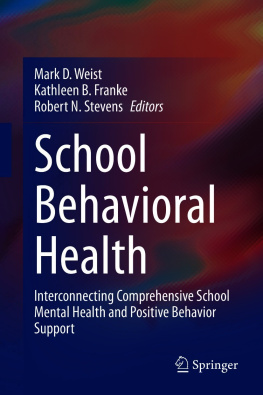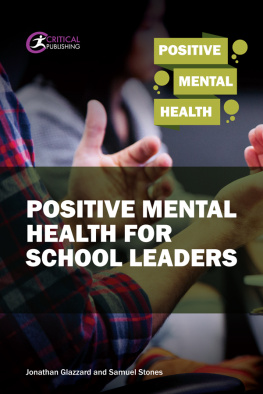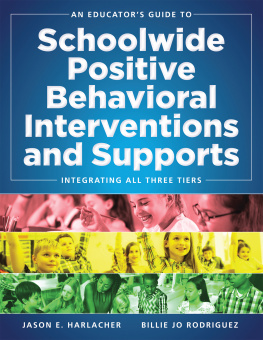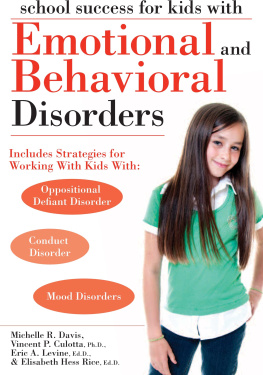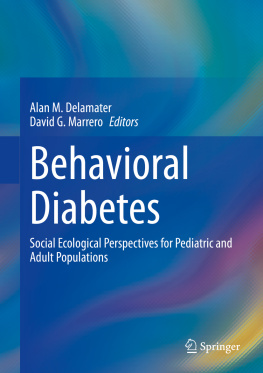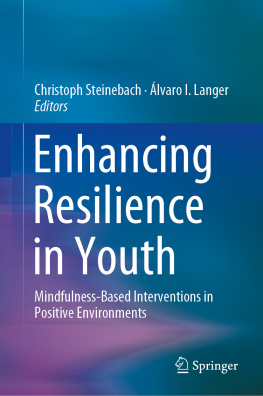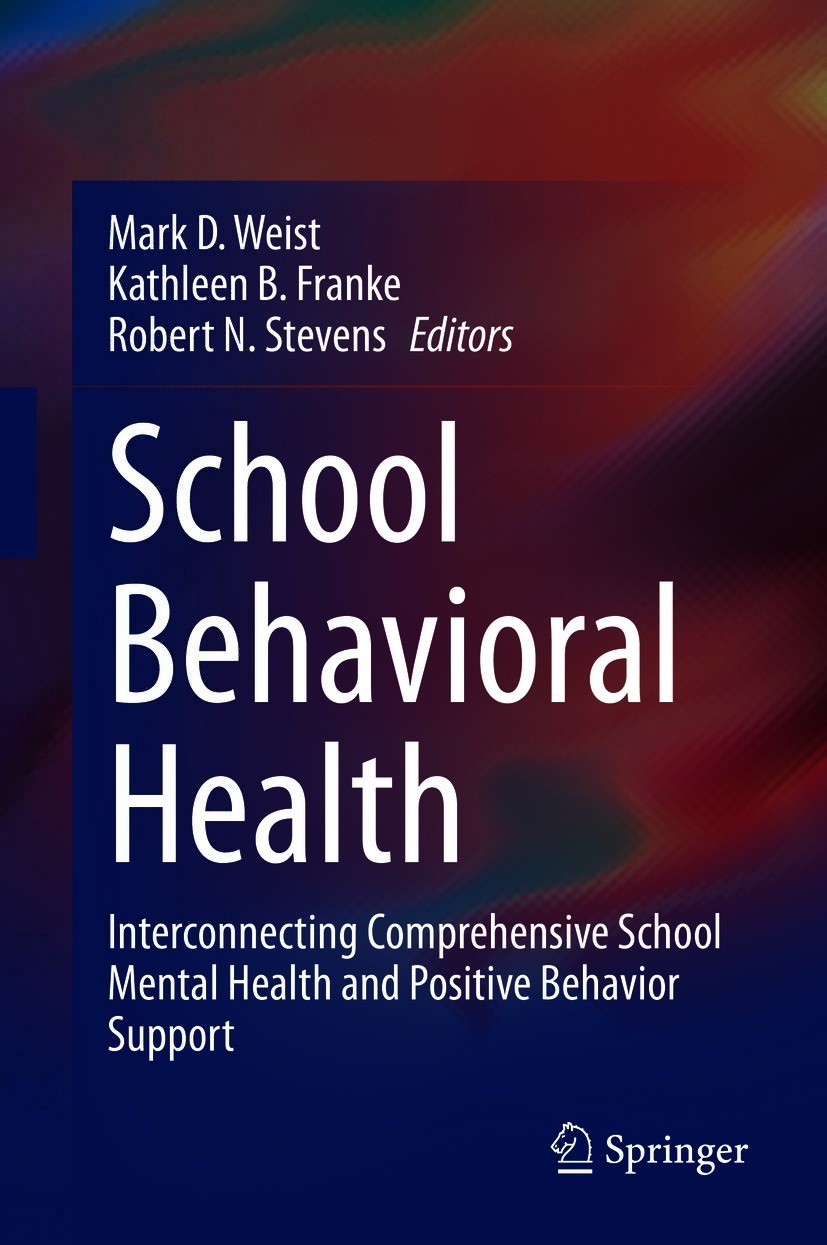Editors
Mark D. Weist
Department of Psychology, University of South Carolina, Columbia, SC, USA
Kathleen B. Franke
The Unumb Center for Neurodevelopment, University of South Carolina, Columbia, SC, USA
Robert N. Stevens
Medical University of South Carolina, Goose Creek, SC, USA
ISBN 978-3-030-56111-6 e-ISBN 978-3-030-56112-3
https://doi.org/10.1007/978-3-030-56112-3
Springer Nature Switzerland AG 2020
This work is subject to copyright. All rights are reserved by the Publisher, whether the whole or part of the material is concerned, specifically the rights of translation, reprinting, reuse of illustrations, recitation, broadcasting, reproduction on microfilms or in any other physical way, and transmission or information storage and retrieval, electronic adaptation, computer software, or by similar or dissimilar methodology now known or hereafter developed.
The use of general descriptive names, registered names, trademarks, service marks, etc. in this publication does not imply, even in the absence of a specific statement, that such names are exempt from the relevant protective laws and regulations and therefore free for general use.
The publisher, the authors and the editors are safe to assume that the advice and information in this book are believed to be true and accurate at the date of publication. Neither the publisher nor the authors or the editors give a warranty, expressed or implied, with respect to the material contained herein or for any errors or omissions that may have been made. The publisher remains neutral with regard to jurisdictional claims in published maps and institutional affiliations.
This Springer imprint is published by the registered company Springer Nature Switzerland AG
The registered company address is: Gewerbestrasse 11, 6330 Cham, Switzerland
Foreword
My work in the disability field began over three decades ago with an early career position as a paraprofessional. I subsequently have held positions as a special education teacher, mental health provider, consultant, and researcher. My commitment to the particular population of children and adolescents with emotional and behavioral problems began early on, as I was challenged by intervention limits, the excessive use of punitive procedures, and the lack of advocacy for this group of students.
Much has changed over the past 30 years. Highly punitive procedures that were conventional as recently as a decade ago have become far less standard, in favor of approaches that endeavor to understand the causes of problem behavior as well as the role of childhood experiences, such as trauma. Many schools have adopted universal screening procedures, with efforts to discover all students who might need behavioral and mental health support. Tiered systems of support in schools are on the rise, promising efficient and effective intervention matched to student needs. Preventive and instructional programs are being introduced to children at a young age, with follow-through efforts as children age. Finally, the education field has recognized and embraced the importance of research- and evidence-based programs and practices.
Still, outcome data do not bode well for our efforts. Little change is evident across many indicators of progress. Students with emotional and behavioral problems continue to surpass all other disability groups across measures of disciplinary referrals, suspensions, grade retention, and school dropout. Suicide rates among adolescents have seen a recent acceleration, according to data from the Centers for Disease Control and Prevention. And, poor outcomes endure into adulthood, with unemployment and underemployment, limited enrollment in postsecondary education, and high rates of involvement with the criminal justice system.
The presumably favorable shift in the nature of positive intervention approaches, the earlier onset of preventive efforts, and the adoption of more rigorously researched intervention strategies and programs does not seem to align with the persistently poor outcome data for students with social and emotional needs. So, how do we explain the incongruent data? I believe one explanation is that we have overwhelmingly focused on prevention. We have seen a recent surge in implementation of interventions targeted at the universal (tier 1) level. Intervention at this level brings about much contentment, as large decreases in problem behaviors (e.g., disciplinary referrals) ensue. While these efforts should be applauded, they often occur at the expense of the population of students with more intensive needs. This lack of attention to problems of greater concern and severity is exacerbated by the persistent aversion and stigma toward behaviors (internalizing and externalizing) that leach the boundaries of conventional school behavior.
So, how do we move forward? Indeed, we must continue (and perhaps expand) early prevention and intervention efforts. There is ample evidence from rigorous research studies that tiered and preventive systems of support work. For instance, school-wide efforts, such as Positive Behavioral Interventions and Supports (PBIS), have a substantial impact. These efforts need to be further expanded to all school settings. Most importantly, in spite of PBIS, teachers continue to struggle with students who exhibit emotional and behavioral problems in their classrooms, the setting where students spend most of their school day. This is just one area where attention should be directed. There is an abundance of evidence that pre-service training and in-service support and induction programs are deficient for preparing teachers to support students with challenging behaviors. This must be improved.
At the same time, school- and program-wide data cannot obscure the outcome data for students with the most intensive needs (tier 3). The data must be parceled, which will compel us to direct attention to also improving intervention for students with more intensive needs at tier 3. Moreover, there are no data to suggest that mental health problems can be entirely eliminated for a variety of risks and environmental reasons. This is supported with convincing models of illness and disease that have been approximated in medicine, public health, and other fields. We must consider intervention a routine practice. At the same time, there is compelling evidence that emotional and behavioral problems can be greatly reduced.
This brings us back to the topic of school behavioral health. The efforts we have undertaken over the past several decades are undeniably insufficient. As yet, the pieces have not come together to forge a meaningful impact. And, as this book attests, the answer is not simple. What this book offers is a blueprint for moving forward. The authors spell out the collective effort that is needed to accomplish the important goal of providing comprehensive and effective school behavioral health services.
To do so, the authors lay out five themes: (a) building partnerships between education, families, mental health, and other youth-serving systems; (b) developing effective school-wide approaches; (c) promoting cultural responsiveness and humility; (d) improving the quality of services and increasing the use of evidence-based practices; and (e) improving implementation support for evidence-based practices. In addition to these five theme areas, three priority populations students connecting to child welfare and juvenile justice systems and from military families are addressed. The authors take a deep dive, rely on community members with unique expertise, and explore issues in a way that has not been previously seen.

